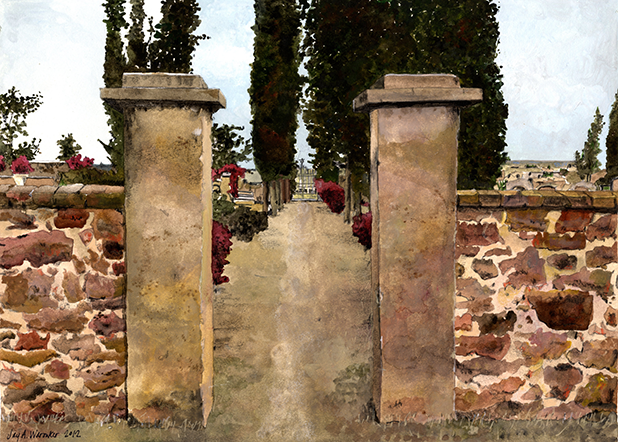 Exterior View (2012), 15” x 11” Watercolor, Jay A. Waronker
Exterior View (2012), 15” x 11” Watercolor, Jay A. Waronker
Eritrea
Jewish Cemetery
|
On the edge of Asmara, an Italian cemetery dating to the late 19th century can be visited, and here there is a Jewish section. |
|
In the nineteenth and early twentieth centuries, the seaport city of Aden in Yemen as a British colony was home to a substantial number of Jews. By the 1920s and early 1930s, the socio-political situation of Jewish community among the wider population in that country had deteriorated, and some Jews choose to leave at that time. This pattern continued in the 1940s, 50s, and early 60s, with more Jews emigrating, including several to Israel. In 1967, the British finally surrendered Aden, and nearly all of the remaining Adenite Jews left with them, moving mostly to Israel or Great Britain. A small contingency wanted to remain in the region, however, and they came to settle across the Red Sea or Gulf of Aden in Djibouti, Ethiopia, and Eritrea.
By the early years of the twentieth century, Asmara in central Eritrea had a large and sustainable enough Jewish community to require a cemetery. The community, which peaked according to some accounts at five-hundred people shortly after World War II and into the early 1950s, was made up mostly of Jews from Aden, yet there were others. As a product of Italian colonialism, Asmara also included a handful of Italian Jews and well those from an assortment of countries as refugees of Nazi Europe.
Eritrea underwent a period of tremendous transition during and after World War II, including British occupation followed by Ethiopian annexation in 1961 that eventually resulted in decades of civil war between the two countries. When the autocratic and intolerant regime of the Derg under the leadership of Mengistu Haile Mariam came into power in Ethiopia in 1974, more Jews including the last rabbi were essentially forced out of Eritrea. These difficult periods led to the substantial decline and eventual demise of Eritrea’s Jewish community. By the late 1970s, only a few dozen of the most hardened and stubborn Jews remained.
By the end of Eritrea’s war with Ethiopia in 1991 and its independence two years later, Asmara had essentially lost its entire long-standing Jewish community. By the early years of the twenty-first century, only one Jew, the native-born Samuel Cohen, was left in town. For years Cohen has served as the caretaker of the synagogue and its resident historian. The synagogue, lonely and often closed, continues to be adequately maintained and watched over, yet prayer services are rarely held here since a minyan (quorum for a full service) cannot be organized. The building survives today more as a relic of a bygone era and a curious tourist destination for those that are able to get a tourist visa to the country than as a fully-operational Jewish house of prayer and community center.
On the edge of Asmara, an Italian cemetery dating to the late nineteenth century can be visited, and here there is a Jewish section. Over the years, some one hundred fifty members of the Jewish community have been buried here, and the last was in the late 1990s.
